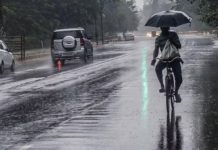In Galle, on Sri Lanka’s southern tip, you would not have known that the country is in the midst of a political crisis blamed for scaring away the tourist dollars crucial to the island’s economy.
Thousands of English cricket fans have descended on this picturesque corner of the island where the fort, dating back to 1558, overlooks the cricket ground at which Joe Root’s touring side are taking on Sri Lanka in the first of three Test matches.
The night before the Test began – and despite torrential rain – restaurant and hotel owners on this quaint peninsula that juts out into the ocean turned away customers in droves for being too full.
Elsewhere on the island, however, the picture is very different. As two prime ministers fight for power, the already struggling economy is now tanking amid peak political uncertainty, with the rupee at a record low against the dollar.
Infrastructure projects funded by the US and Japan were due to inject around $2bn into Sri Lanka while the International Monetary Fund (IMF) was set to announce an agreement over the release of a further loan when President Maithripala Sirisena sacked his prime minister, Ranil Wickremesinghe, dissolved the cabinet and suspended parliament after a testy relationship reached breaking point last week.
“We are monitoring the situation closely and we remain in contact with our counterparts at the technical level,” an IMF spokesperson said, but the situation that they are monitoring is becoming ever more complex.
As things stand, Mr Wickremesinghe is refusing to leave office or the official prime ministerial residence, Temple Trees, because he says his sacking is unconstitutional.
A further twist is that President Sirisena has already appointed Mahinda Rajapaksa as Mr Wickremesinghe’s successor – the man commonly blamed for piling the island nation with debt and accused of war crimes at the end of the country’s civil war but also the man that Mr Sirisena turned on in the 2015 election.
Now, though, they are allies again, and are working behind the scenes to get enough MPs to turf out Mr Wickremesinghe – who is refusing to leave until his ousting is confirmed by a parliamentary vote, as per the constitution.
Mr Sirisena is delaying the vote until he can amass the necessary numbers, leaving the country in a tense political stalemate that has bubbled over and resulted in the loss of one life already.
To add to the troubling element of violence, President Sirisena has claimed that a minister in the dissolved cabinet was part of an assassination plot against him, while Mr Wickremesinghe warned in the wake of last week’s shooting that the country could be on the brink of a “bloodbath”.
As well as the pre-existing economic concerns, this instability could have dire consequences for the island nation’s tourism industry.
It was only in October that well-respected travel guide Lonely Planet named Sri Lanka its “Best in Travel” for 2019. With more than 2.5m foreign holidaymakers visiting every year, tourism plays a key part in the country’s economy, responsible for bringing in an estimated $3.5bn.
Officials had expected that to rise by around 10 per cent in the coming year but hotels and tour operators have begun to report a spate of cancellations, and should that flatline or even decrease, then the economy will take a further hammer blow.
Deluxe hotels have reported “a critical decline in new bookings” since the political crisis exploded, according to AFP, with one Colombo city hotel executive adding: “This comes at the worst possible time when people in Europe are making their holiday plans abroad. We have had a lot of cancellations from the United States.”
“With the political crisis our winter season is gone,” the director of a luxury beach resort in the south of the island said, suggesting that the brief boon provided by English cricket fans may only be a sticking plaster for a far greater problem.
Back in Colombo, there are murmurs of a parliamentary vote being scheduled for 15 or 16 November. Whether that means that the president and Mr Rajapaksa believe they will have the votes they need to oust Mr Wickremesinghe is still unclear, but Sri Lanka’s tourism industry and its wobbling economy are in desperate need of some calm and clarity.











